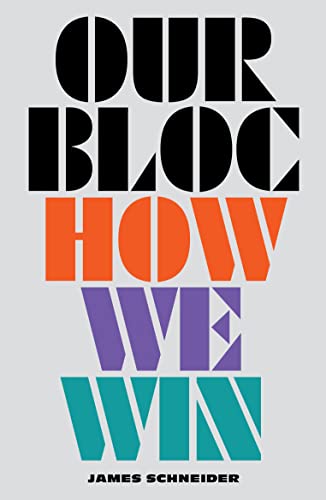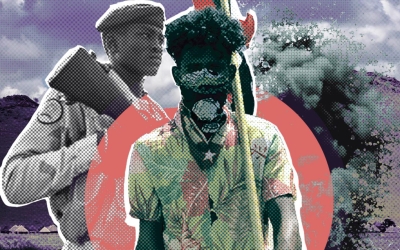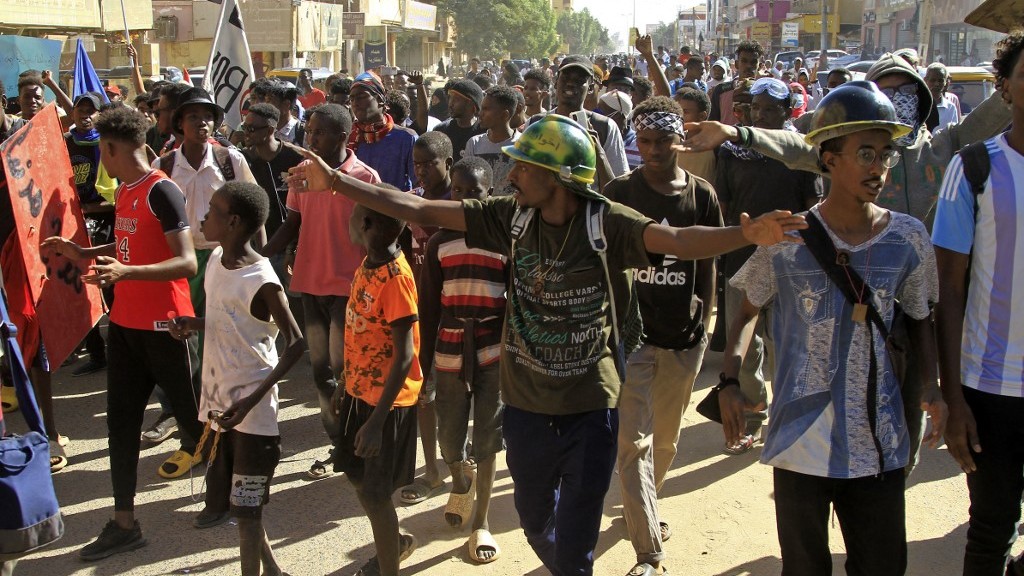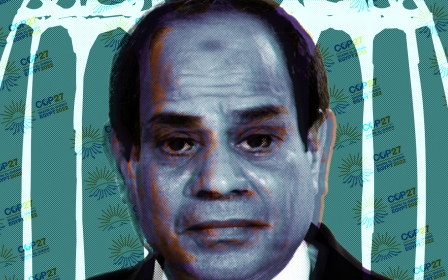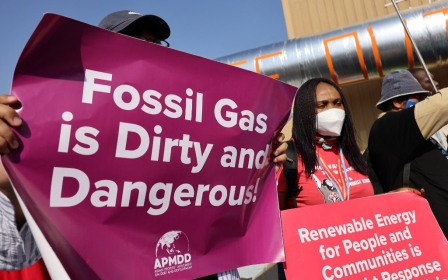'Planet or death': How we can beat the climate crisis and economic disaster
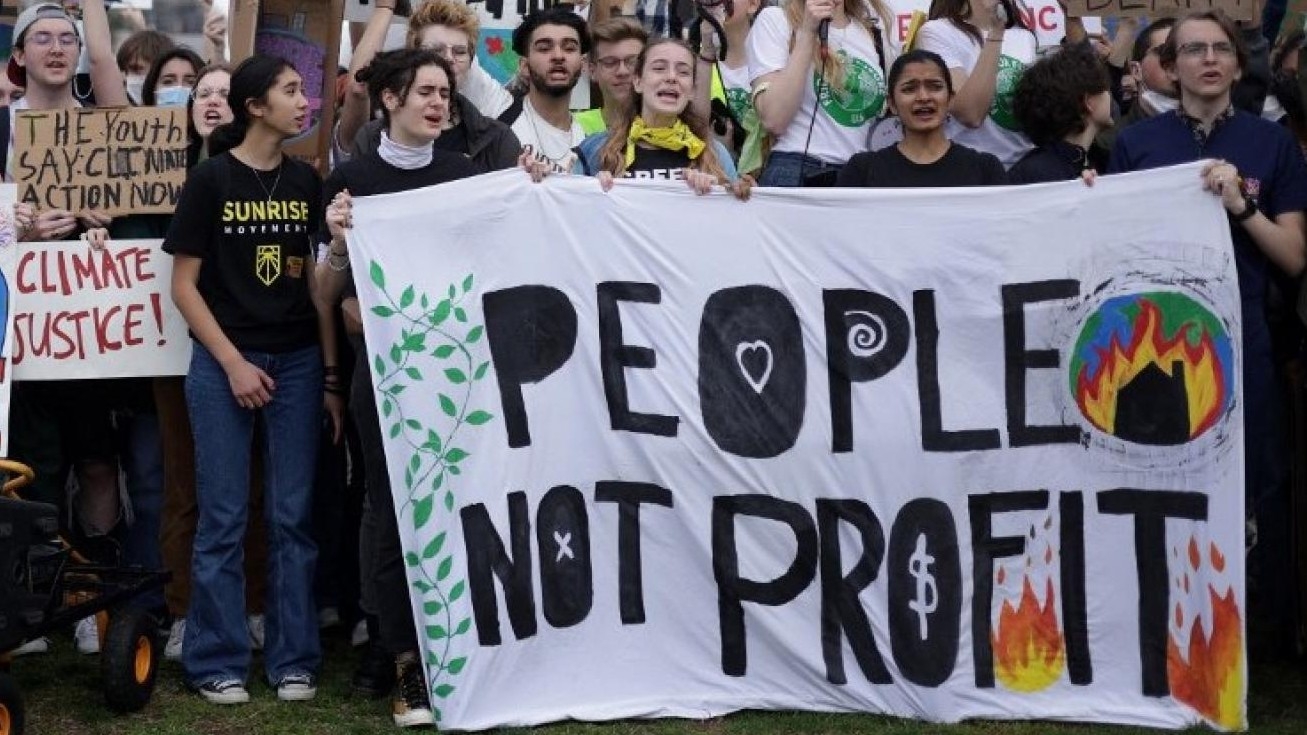
A social and ecological crisis rises like a tsunami, ready to crash down on the peoples of earth.
In 2022, its shadow spread. In March, both the Arctic and the Antarctic were 30 degrees Celsius hotter than average. Parts of China’s great Yangtze River dried up. Europe experienced its worst drought in 500 years. Floods in Pakistan damaged more than two million homes.
Worldwide, nearly a billion people go to bed hungry as food prices surge. Supply chains have been interrupted as the globalised, just-in-time economic model, underpinned by the US military, frays. Prices rise as wages fall. Nations around the globe are weighed down by debt. And in 2023, things are set to get worse.
Our planetary picture is not a happy one. How can we make sense of it? And what is to be done?
Our planetary picture is not a happy one. How can we make sense of it? And what is to be done?
Three phenomena interlock and intensify one another: a climate emergency, a cost-of-living scandal and a debt crisis. They require global responses on an enormous and unprecedented scale.
New MEE newsletter: Jerusalem Dispatch
Sign up to get the latest insights and analysis on Israel-Palestine, alongside Turkey Unpacked and other MEE newsletters
But the current system is not fit for the task. Every year, the Cop meetings fail to prevent climate breakdown. And almost every year, the modellers’ worst-case scenario predictions come to pass.
It was no better during the Covid-19 pandemic. The world had the manufacturing capacity to produce enough vaccines to jab everyone on Earth in just 12 months. But, to inflate the bank balances of western pharmaceutical companies, rich countries - led by the EU and UK - blocked proposals for the World Trade Organization (WTO) to remove intellectual property restrictions on Covid vaccines so anyone could make them anywhere.
People died and livelihoods were lost so that a tiny few could become even richer.
The same logic applies to the management of international debt. The International Monetary Fund (IMF) places the bottom line of those who want for nothing over the lives of those in need. It demanded spending cuts from countries during the pandemic and repayments from Ukraine as it faced the Russian invasion. Sri Lanka, where more than 30 percent of the population is food insecure, paid tens of millions to the IMF in the first week of December.
Sustainable development
In this context, few governments - with notable exceptions - are able or willing to establish broad-based social and economic sustainable development.
That failure shreds popular support for the global order and local elites, with a global average of 64 percent saying their country is on the “wrong track”. This breakdown in consent leads to greater coercion and violence from authorities, with Amnesty International stating that “the right to protest is under unprecedented and growing threat across all regions of the world”.
It also leads to greater political volatility. Where the left has organisational and popular depth, such as in many countries in Latin America, it can compete. But we also see the mushrooming of a hard right - Jair Bolsonaro in Brazil, Donald Trump in the US, Marine Le Pen in France, Giorgia Meloni in Italy, Narendra Modi in India, and others have all increased their votes at successive elections - that channels popular discontent with the established order while buttressing it.
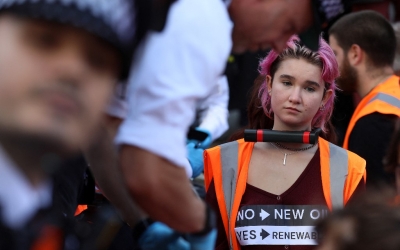
These economic and social conditions are likely to produce a “wave year” of strike action and protest across the planet. Such years are infrequent, but tend to track the crises of the capitalist world system: 1905, the years immediately following each World War, the mid-1930s and the mid-1970s.
The last wave came around 2011, made famous by the Arab Spring, which toppled governments in Tunisia, Egypt and Libya, and saw the beginning of a civil war in Syria.
But those uprisings were part of a broader global wave that followed the 2008 financial crisis, which included factory strikes in China, the Occupy movement in the US, anti-austerity protests in Europe, and other uprisings around the world.
Just over a decade on, the situation for many is worse. The last wave failed to significantly shift global power in the direction of the vast majority, or to reform existing institutions to make them more responsive to popular needs. Coordinated counter-revolutions, domestic repression and proxy battles ensued. The various forms of ad hoc organisation roused to action - neighbourhood, community, factory, industry committee - were too readily demobilised. The energy was there, but it dissipated.
How can progressive people and organisations make the coming wave different? How can the next protest wave move from resisting the old system to building a new one?
Laying a foundation
Every country is different, but power must be built at three levels: national, transnational and international. In my book Our Bloc: How We Win, I lay out a UK-specific plan with three key elements that have some relevance beyond British shores.
Firstly, we must bring together as many progressive forces as possible - trade unions, feminists, anti-racists, environmentalists, tenants, debtors, farmers, the political left and so on - into a left-wing bloc. This process can take many forms, from enhanced coordination to an explicit, open alliance. But in each, the aim is the same: to strengthen both the particular struggle and the wider movement.
In the UK, this would involve building on the growing resistance to the cost-of-living and climate crisis - workers on strike, millions not paying their bills, climate occupations and direct action - and uniting them into a leftist bloc. Such a group would coordinate different struggles, bring their message to the country, and spread confidence from one area to the next.
That alliance could then join other campaigns and progressive forces fighting the cost-of-living crisis, such as tenants’ unions, and combine with anti-racist and feminist groups, as well as the remaining left in the Labour Party.
In India, it would involve building on the farmers’ strike of last year, which was one of the largest in human history and forced Modi’s government to scrap neoliberal laws that would have hit both small and large farmers hard.
New anti-worker labour codes have been pushed through, however, and are being resisted by trade unions. To have a chance of victory, such mobilisation must be broad and sustained, not only in alliance with farmers but also with unemployed, precarious and gig workers, who are often younger and harder to reach by traditional unions.
Secondly, the bloc must be focused on mobilising a social majority by addressing their material needs through linking the cost-of-living scandal to the climate crisis. Or, as a placard at a protest in France read: “End of the world, end of the month: same struggle.” One cannot be solved without the other, because today, they stem from the same root: fossil capitalism.
To turn the tables, we need real democracy; popular sovereignty enhancing the power of the people at every level of social life. Thus, thirdly, widespread social mobilisations need to enter politics, so that the social majority can become a political majority.
Resistance committees
For this to happen, two paths should run in parallel. Firstly, social and worker unrest throws up new - and usually temporary - organs for popular organisation.
These have had different names in different places and at different times in history: neighbourhood defence committees, factory committees, community assemblies, workers’ councils, general assemblies and so on - but they all seek to provide coordination, organisation and collective leadership in the heat of a given struggle.
When that heat cools, these ad hoc groups tend to be demobilised and dispersed. To allow that to happen is a fundamental mistake. These potential elements of dual power should be cherished and protected. They make real democracy - the rule of the people, for the people - possible.
Take the example of Sudan, where neighbourhood resistance committees have been active across the country since 2013. In 2019, they played a powerful role in popular protests that led the military to remove longtime leader Omar al-Bashir.
The committees did not demobilise, but continued their struggle, pushing for a democratic Sudan. Their force has meant that the counter-revolution, in the form of a coup last year led by General Abdel Fattah al-Burhan, was not the end of the story.
Ongoing protests and resistance have forced the military administration to continue to pay lip service to handing over power. The hope of a democratic Sudan remains alive.
Secondly, in the countries where this is possible, power must be sought through the transformation of an existing political power - or the building of a new one - to act as a gigantic lever for popular mobilisations, an ally to progressive movements and an electoral force.
That would involve placing the leftist bloc's demands and energy at the heart of a political party, so that it remains accountable to the people once it enters government. The continuing strength of the organs of popular power - such as Sudan’s resistance committees - can play a pivotal role in forcing a progressive government to deliver on its promises and not be coopted by the existing ruling class.
Transforming the system of production that generates gross inequality and climate breakdown will otherwise remain elusive.
But that system of production is far from a national affair, so these movements within nations need to cross borders to challenge transnational power. The terrain of capital’s rule is global, but resistance to that domination takes many forms and is often divided by geography and issue.
Countering capital, fighting Amazon
Take something as relatively commonplace as a phone charger bought from Amazon.
Behind that transaction sits a chain that might stretch from a mine in Congo's North Kivu, through global shipping, to manufacturing in the Mekong Delta, to warehousing in the Lower Rhine, to delivery, through to tax minimisation in Luxembourg and regulation management through K Street lobbying in Washington. That supply chain contains exploitation at every step.
To confront that chain of abuse, we need to unite the diverse resistances it generates. That’s what the Make Amazon Pay campaign, which I help coordinate on behalf of Progressive International, does.
Now in its third year, it brings together more than 80 organisations, including most of the trade unions active in Amazon, as well as environmental and tax justice groups, to stage global days of strikes and protests. The most recent took place on 25 November and saw dozens of strikes and protests in more than 35 countries.
We will need thousands of positive forward steps to build a new, humane, democratic order to replace the existing regime
These actions unite workers throughout the Amazon supply chain to raise their demands and unite them with calls for climate action, racial justice, indigenous rights, privacy, data autonomy, consumer rights, consideration for small businesses and non-militarisation.
These demands are heard at many levels: from citizens, consumers, workers and their unions, and politicians around the globe - hundreds of whom support the campaign. This situation results in a many-versus-one effect, with people from many different background and nations focusing their collective resistance against a common opponent.
The Make Amazon Pay campaign can serve as one model for building a global counter-power to transnational capital. This type of organising is at a relatively undeveloped level and could be dramatically expanded.
Transnational corporate power is propped up by an international system designed to promote capital accumulation over the wellbeing of the peoples of the world. It seems immune from reform, no matter how many Global South nations come together to demand it. The experiences of the pandemic, climate breakdown and global debt should teach us that.
Alternative system
Instead, we need to build an alternative international system - a multilateralism from below that extends popular sovereignty.
This would involve bringing together the world’s few progressive governments to, for example, build new institutions to support one another’s health through the production and distribution of medicines and machinery; develop a national debtors’ union to take collective action on debt; enhance South-South trade, cooperation and industrial development; share technological advances outside of the exiting restrictive WTO patent system; and stabilise global food prices through a coordinated shift in control of global agriculture to new regional blocs.
If this were to be successful, other Global South states without progressive governments would find joining the developing alternative to be in their material interests, at least in some areas.
For example, in healthcare, a bloc of progressive states would become attractive to others when it shows it can collectively lower the cost of medicines and medical machinery, while boosting domestic production of pharmaceuticals and speeding up the adoption of new drugs and treatments.
Each advance at the national, transnational or international level will create more room for manoeuvre. We will need thousands of positive forward steps to build a new, humane, democratic order to replace the existing regime. But nothing less than regime change is needed to prevent the tsunami from destroying so much that we love.
It is a radical outlook, but in the context of climate breakdown, no less is required. As Inger Andersen, executive director of the UN Environment Programme, warned recently, “We had our chance to make incremental changes, but that time is over.” She went on to note: “Only a root-and-branch transformation of our economies and societies can save us from accelerating climate disaster.”
Our rulers won’t carry out such a transformation. It is not in their interests. Instead, as sketched out above, we must use the coming protest wave to build popular power - nationally, transnationally and internationally - to carry it out.
Revolutionaries of a previous era cried, “Homeland or death, we will win.” We have no choice but to be even more ambitious: Planet or death, we will win.
The views expressed in this article belong to the author and do not necessarily reflect the editorial policy of Middle East Eye.
Middle East Eye delivers independent and unrivalled coverage and analysis of the Middle East, North Africa and beyond. To learn more about republishing this content and the associated fees, please fill out this form. More about MEE can be found here.



